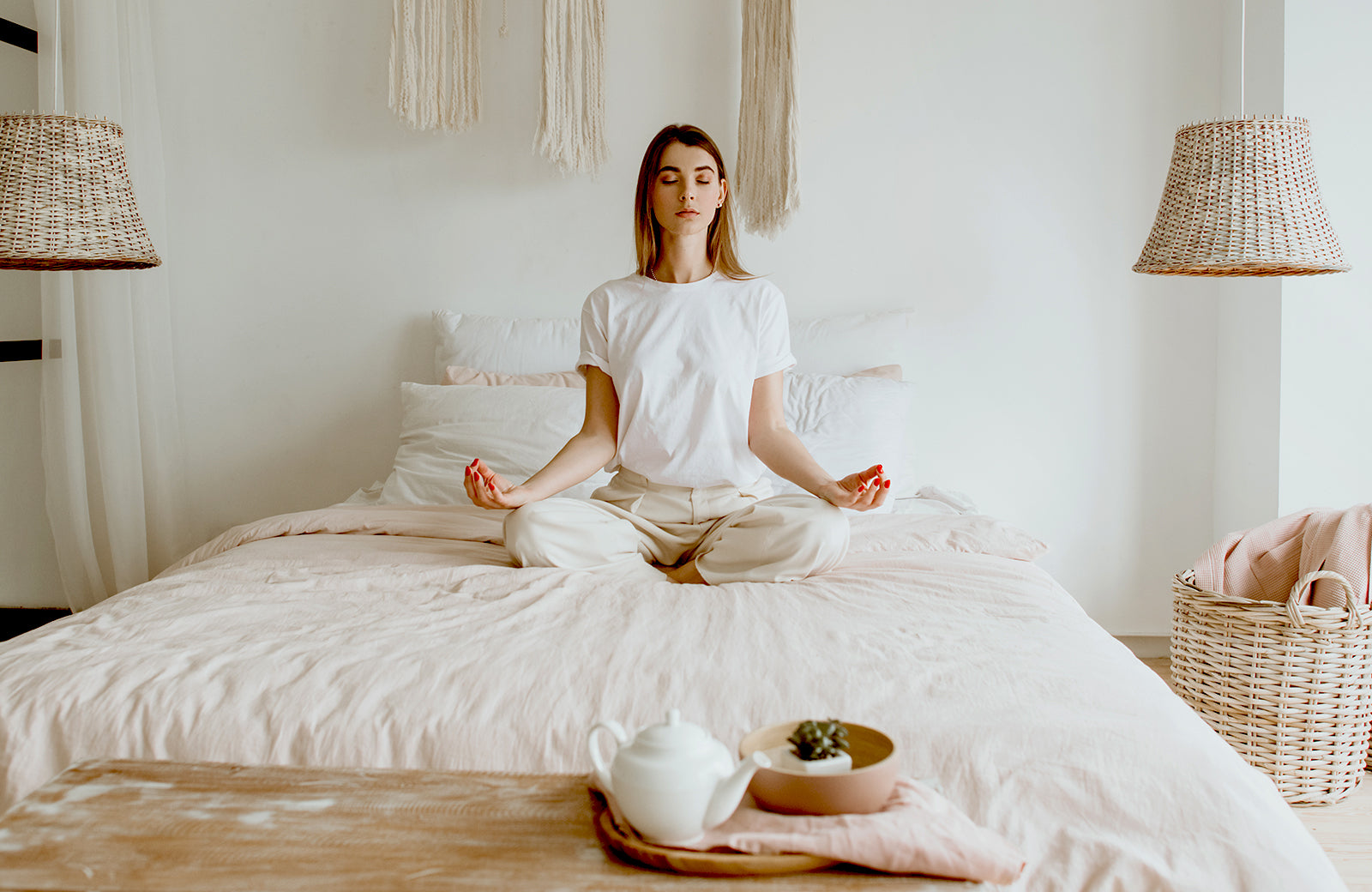
Sleeping relaxed - tips for relaxation before sleep
When falling asleep is difficult and we can't unwind in the evening, we're usually lacking proper relaxation. Learn how to reduce your stress levels with simple methods, promote falling asleep, and support restful sleep.
Table of contents- Relax before sleep
- 4 tips for relaxation before sleep
- Conclusion
1. Relax before sleep
We've all probably been in this situation before: You're lying in bed and just can't fall asleep. Studies show that stress and psychological strain are among the most common causes of sleeplessness. Relaxing in the evening and before bedtime is therefore important for a healthy and restful sleep. We'll show you four methods to help you unwind faster and fall asleep more relaxed.
2. 4 tips for relaxation before sleep
#1 Downshift and reflect
First, switch off! During the day, we receive a wealth of information and impressions and have to take care of many important tasks – it's quite exhausting. Our memory is particularly active during deep sleep and processes the new memories. Therefore, it can be helpful to review the past day in the evening and sort out tasks for the next morning. Try to organize and structure your thoughts so that you can avoid potential stressors and clear your head. Then nothing will stand in the way of a restful sleep. By the way: You can find out more about memory and sleep here. here .

#2 Evening routines and fixed rituals
A regular evening routine can help with problems falling asleep. Individual rituals can contribute to your relaxation by ensuring that you can calm down mentally and physically and get used to fixed structures. In combination with more sleep tips, such as maintaining a regular bedtime, have a positive effect on falling asleep and improving sleep. Warming herbal tea or hot milk with honey, an evening walk at the same time, or the tried-and-true bedtime reading are excellent ways to promote sleepiness and relaxation before falling asleep.
#3 Relaxation techniques
We will introduce you to two well-known techniques that can bring the body into a state of relaxation and prepare it for restful sleep.
Autogenic training
Autogenic training is intended to lead to physical and mental relaxation and prepare you for sleep with the help of a type of self-hypnosis.
How it worksLie or sit comfortably and formulate short, calming thoughts in your mind, such as "I'm tired and I'm relaxing" or "My arms are getting heavy." Repeat these short phrases in your mind over and over again and feel if your body responds and you relax.Progressive muscle relaxation
Progressive muscle relaxation aims to relieve your body bit by bit of stress-related tension and thus optimally prepare it for a restful sleep by specifically tensing and relaxing muscle groups.
Here's how: Lie or sit comfortably and try to focus on individual muscles and body parts in a specific order. For example, start with your right hand.Tense the muscles there and then release the tension completely after holding it for a moment. Continue this movement through the arms, legs, shoulders, and other parts of the body until the body is completely relaxed.Here you will find further information and a great guide for progressive muscle relaxation.
#4 Breathing exercises
Inhale, exhale – fall asleep! Breathing techniques help you relax before bed and have proven to be a simple sleep aid. Everyone has to try it out for themselves to determine which method ultimately leads to fatigue. While some techniques involving breathing, counting, and breath-holding work well for some, they cause stress for others and thus hinder sleep. That's why we'll show you two different methods.
The 4-7-8 method
The 4-7-8 technique is a well-known breathing technique for falling asleep. It promises to help you fall asleep within 60 seconds.
How it worksBreathe in for four seconds, hold your breath for seven seconds, and then breathe out as evenly as possible for eight seconds. Repeat these steps until you fall asleep.Deep breathing
If you tend to sweat when breathing and counting at the same time, deep breathing may be more suitable for you.
How it worksBreathe in and out deeply and evenly. This simulates the calm breathing of sleep and helps relax your body and prepare for sleep.

3. Conclusion
-
Relaxation is an important prerequisite for restful sleep and promotes falling asleep.
-
The mental reflection and structuring of information, impressions and tasks creates clarity and supports mental relaxation.
-
Relaxation techniques such as autogenic training or progressive muscle relaxation can prepare you for sleep and improve falling asleep.
-
The 4-7-8 method or deep breathing calms the body and mind and gently supports falling asleep.
Best wishes and see you soon!



Leave a comment
This site is protected by hCaptcha and the hCaptcha Privacy Policy and Terms of Service apply.